


It’s a quick no. The fizzy beverage that we enjoy can be harmful to our four-legged companions. High sugar content and caffeine are just two reasons why sharing that can with your pet isn’t a good idea. While it might be tempting to let them have a taste, the consequences can be serious.
Many people might not realise that the ingredients in these fizzy drinks can lead to health issues. For example, excessive sugar can cause obesity and dental problems, while caffeine can result in restlessness and even more severe reactions. As someone who has shared my home with a few canines, I’ve learned the hard way that what’s safe for us isn’t always safe for them.
During one summer barbecue, I made the mistake of letting my pup have a few drops of my soda. At first, it seemed harmless, but soon after, I noticed him acting unusually hyper. After a quick search, I was relieved that nothing serious happened, but it was a wake-up call. If you want to keep your furry friend healthy, it’s best to stick to water and specially formulated pet drinks instead.
Can a Canine Consume Soda?
Absolutely not. The sugary beverage is harmful for our furry companions. High levels of sugar can lead to obesity and diabetes, which are serious health concerns. Additionally, caffeine found in many soft drinks is toxic for them, potentially causing restlessness, rapid heart rate, and even seizures.
It’s crucial to avoid sharing any carbonated drinks. These beverages can cause gastrointestinal distress, leading to discomfort and bloating. Even small amounts can be detrimental, so always opt for fresh water as the main thirst quencher.
If your four-legged friend accidentally ingests some, watch for signs of distress. Symptoms may include excessive panting, hyperactivity, or vomiting. In such cases, consulting a veterinarian is advisable to ensure their wellbeing.
Instead of indulging them with soda, consider offering safe and healthy alternatives like plain water or specially formulated pet drinks. Keeping them hydrated with appropriate options is essential for their health and happiness.
The Ingredients of Coke and Their Effects on Dogs
It’s crucial to understand that the composition of this popular beverage is not suitable for our furry companions. Here’s a breakdown of the primary ingredients and their implications for pets.
Sugar
High levels of sugar can lead to obesity and dental issues in animals. The excessive sweetness might cause hyperactivity, followed by a crash in energy levels.
Caffeine
- Caffeine is toxic for many animals. Even small amounts can cause restlessness, rapid heart rate, and other serious health concerns.
- Symptoms of caffeine toxicity include vomiting, tremors, and in severe cases, seizures.
Carbonated Water
While carbonation itself isn’t harmful, the bubbles can lead to discomfort or bloating in pets. This can result in digestive upset, making them feel unwell.
Artificial Flavours and Colours
- These additives can provoke allergic reactions or gastrointestinal distress.
- Some ingredients may be harmful over time, potentially impacting overall health.
In summary, the components of this popular soft drink pose various risks to animal health. It’s always best to stick to water or specially formulated beverages designed for pets. Keeping our companions safe should be a priority, and avoiding harmful substances is a straightforward way to ensure their well-being.
Symptoms of Coca-Cola Consumption in Pets
If a furry friend accidentally consumes a sugary fizzy beverage, it can lead to several adverse reactions. Watch for the following symptoms:
| Symptom | Description |
|---|---|
| Vomiting | Loss of appetite and expelling contents, potentially due to irritation in the stomach. |
| Diarrhoea | Loose or watery stools, indicating gastrointestinal distress. |
| Increased Thirst | Excessive drinking behaviour, as the body tries to compensate for dehydration. |
| Hyperactivity | Uncharacteristic restlessness or excessive energy due to caffeine. |
| Tremors | Shaking or spasms, which may arise from caffeine toxicity. |
| Rapid Heart Rate | Elevated pulse rate, indicating potential stress on the cardiovascular system. |
If any of these signs appear, prompt consultation with a veterinarian is advisable for appropriate guidance. Keeping such beverages out of reach is essential. For cleanliness, consider using best washing machine anti bacterial gel to maintain a safe environment for your pet.
What to Do if Your Pet Consumes Soda
If your furry friend has ingested soda, the first step is to stay calm. Monitor their behaviour closely for any signs of distress. If your companion shows symptoms such as restlessness, excessive thirst, or lethargy, it’s essential to act quickly.
Contact your veterinarian immediately, providing them with details on how much soda was consumed and the time it occurred. If possible, take the packaging with you or provide the vet with information about the specific beverage, as the ingredients can vary.
Do not induce vomiting unless directed by a professional. Inducing vomiting can sometimes cause more harm than good, especially if the substance is caustic. Instead, keep your pet hydrated by offering fresh water, as caffeine can lead to dehydration.
Watch for severe reactions, such as rapid breathing, tremors, or seizures. If any of these symptoms arise, take your companion to an emergency veterinary clinic without delay.
Prevention is key. Keep all beverages, especially sugary or caffeinated ones, out of reach. Educate family members about the dangers of sharing human food and drinks with pets. Creating a safe environment will help avoid such incidents in the future.
Long-Term Effects of Caffeine on Canines
Regular consumption of caffeine can lead to serious health issues in pets. Prolonged exposure to this stimulant can result in increased heart rate, leading to potential cardiovascular problems. Over time, a furry friend may experience heightened anxiety levels, irritability, and even behavioural changes. Weight gain is another concern, as sugary beverages often accompany caffeinated products, contributing to obesity-related complications.
Another significant long-term impact includes gastrointestinal disturbances. Pets might suffer from ongoing digestive issues, including vomiting and diarrhoea. Furthermore, caffeine can lead to dependency; pets may exhibit withdrawal symptoms if caffeine is suddenly removed from their diet.
Monitoring for any signs of these effects is crucial. Regular veterinary check-ups can help detect any underlying issues early on. If your companion has consumed caffeine or products containing it, consulting a vet is advisable to assess any potential risks and necessary interventions.
Alternatives to Coke for Dogs
Instead of fizzy drinks, consider offering your furry friend healthier options that are safe and enjoyable. Fresh water should always be the primary beverage available. It keeps them hydrated and promotes overall health.
For a bit of variety, try low-sodium bone broth. It’s flavourful and packed with nutrients. Just ensure it doesn’t contain onions or excessive salt. You can also make homemade broth from bones, simmering them for hours to extract the goodness.
Another excellent alternative is coconut water. This natural drink is hydrating and contains electrolytes. Just provide it in moderation, as too much can lead to tummy upset.
Fruit-infused water can be a fun treat. Add slices of safe fruits like watermelon or blueberries to fresh water for a hint of flavour. This not only encourages hydration but also provides some vitamins.
If your pet enjoys a creamy texture, consider unsweetened plain yogurt. It’s a great source of probiotics and can be served as an occasional treat. Just be sure they’re not lactose intolerant.
For those with a penchant for snacks, look into specially formulated dog beverages available in pet stores. They are designed to be safe for consumption and often come in unique flavours that can entice your companion.
Always consult with your vet before introducing any new food or drink. And for those pups who might have digestive issues, consider the best dog food for gassy puppies to keep their tummies happy and healthy.
Veterinary Insights on Dogs and Soft Drinks
Veterinarians strongly advise against offering sugary beverages to pets. These drinks contain high levels of sugar and caffeine, which can lead to serious health issues in animals. The risks include obesity, diabetes, and even caffeine toxicity, which can cause severe neurological symptoms.
Understanding the Risks
Research highlights that consumption of sugary liquids can lead to dental problems and gastrointestinal distress. Vets often see cases of pancreatitis linked to high-fat and high-sugar foods. It’s crucial to recognise that even small amounts can adversely affect health, especially in smaller breeds.
Recommendations for Pet Owners
Instead of carbonated beverages, consider providing fresh water or specially formulated pet drinks. If you suspect your furry companion has ingested any harmful substances, contacting a veterinary professional immediately is essential. They can offer tailored advice based on the specific situation and health status of your pet.
In summary, steering clear of caffeinated and sugary drinks is a wise choice for anyone who wants to maintain the health and wellbeing of their beloved animal. Prioritise hydration with safe alternatives and consult a vet for personalised guidance.






